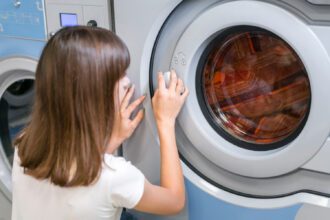Are you tired of dealing with sudden appliance failures that leave you stuck without a functioning refrigerator or oven? By spotting potential issues before they escalate, you can avoid costly repairs and inconvenient downtime. In this comprehensive guide, we’ll explore the common signs of appliance problems and provide actionable tips to identify them early on.
Refrigerator Issues
One of the most crucial appliances in your home is the refrigerator. A malfunctioning fridge can lead to spoiled food, water damage, and even health hazards. Keep an eye out for these potential issues:
- Unusual Noises: If your refrigerator starts making strange noises, such as rattling, clunking, or hissing sounds, it may indicate a faulty compressor or worn-out bearings.
- Leaks and Water Damage: Check the floor around your fridge for signs of water leakage. This could be a sign of a clogged drain tube or a faulty defrost timer.
Oven Issues
Your oven is another essential appliance that requires regular maintenance to prevent unexpected breakdowns. Look out for these potential issues:
- Inconsistent Heating: If your oven is not heating evenly, it may indicate a malfunctioning heating element or faulty thermostat.
- Burn Marks and Food Residue: Check the oven walls and racks for signs of burn marks or excessive food residue buildup. This can be a sign of improper cleaning or worn-out oven racks.
Dishwasher Issues
A malfunctioning dishwasher can lead to dirty dishes, water waste, and even electrical hazards. Keep an eye out for these potential issues:
Leaks and Water Spots: Check the floor around your dishwasher for signs of water leakage. This could be a sign of a faulty door seal or clogged drain hose.
Poor Cleaning Performance: If your dishes are not coming out clean, it may indicate a malfunctioning spray arm or worn-out detergent dispenser.
Washing Machine Issues
A broken washing machine can lead to dirty clothes, water waste, and even mold growth. Look out for these potential issues:
- Unusual Vibrations: If your washing machine starts vibrating excessively during cycles, it may indicate an unbalanced drum or faulty bearings.
- Leaks and Water Damage: Check the floor around your washing machine for signs of water leakage. This could be a sign of a clogged drain pump filter or faulty tub seal.
Dryer Issues
A malfunctioning dryer can lead to hot clothes, energy waste, and even fires. Keep an eye out for these potential issues:
- Long Cycle Times: If your dryer takes longer than usual to dry clothes, it may indicate a clogged venting system or worn-out heating element.
- Burn Marks and Lint Buildup: Check the dryer drum and venting system for signs of burn marks or excessive lint buildup. This can be a sign of improper cleaning or faulty thermostat.
Air Conditioner Issues
A broken air conditioner can lead to hot temperatures, humidity issues, and even mold growth. Look out for these potential issues:
- Reduced Airflow: If your air conditioner is not blowing cold air, it may indicate a clogged air filter or faulty compressor.
- Leaks and Water Damage: Check the floor around your air conditioner for signs of water leakage. This could be a sign of a clogged condensate drain tube or faulty refrigerant leaks.
Microwave Issues
A malfunctioning microwave can lead to uneven cooking, sparks, and even electrical hazards. Keep an eye out for these potential issues:
- Unusual Sparks: If your microwave starts sparking during cooking cycles, it may indicate a faulty magnetron or worn-out turntable.
- Poor Cooking Performance: If your microwave is not heating food evenly, it may indicate a malfunctioning heating element or faulty sensor.
Preventive Maintenance Tips
By incorporating these preventive maintenance tips into your daily routine, you can significantly reduce the risk of appliance failures:
- Regular Cleaning: Clean your appliances regularly to prevent dust and dirt buildup.
- Filter Replacement: Replace air filters, water filters, and dryer vent filters as recommended by the manufacturer.
- Inspection and Testing: Regularly inspect and test your appliances to identify potential issues before they escalate.
By being proactive and identifying potential appliance issues before they escalate, you can avoid costly repairs, inconvenient downtime, and even safety hazards. Remember to stay vigilant, perform regular maintenance tasks, and address any unusual signs or symptoms promptly. With these tips, you’ll be well on your way to a hassle-free home with fully functional appliances.
Additional Tips and Resources
For more information on appliance maintenance and repair, check out these additional resources:
- Manufacturer Guides: Consult your appliance manufacturer’s guides for specific maintenance and troubleshooting instructions.
- Online Forums: Join online forums and discussion groups dedicated to appliance maintenance and repair.
- Professional Assistance: If you’re unsure about addressing a potential issue or require professional assistance, don’t hesitate to contact a licensed technician.
By following these guidelines and staying proactive, you’ll be able to spot potential appliance issues before they escalate, ensuring a safe, convenient, and cost-effective home.
